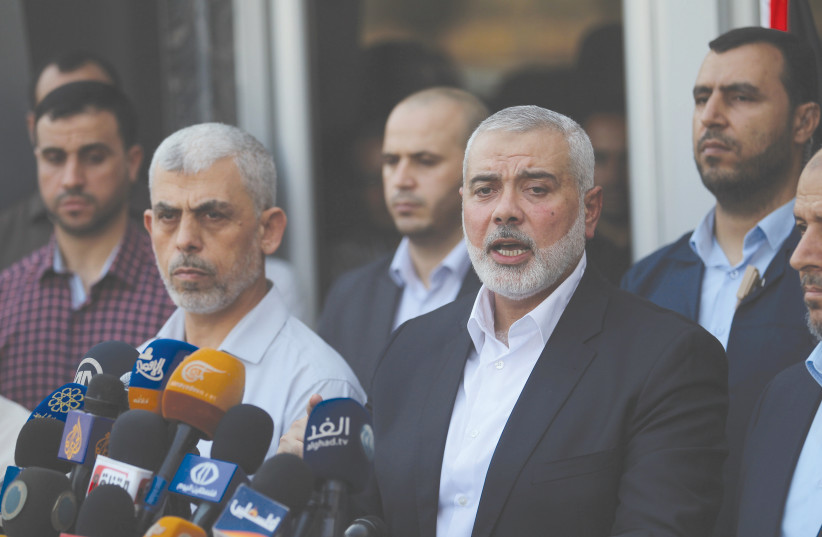Palestinian factions in the Gaza Strip announced on Tuesday that they are opposed to the Palestinian Authority’s intention to hold municipal elections in December.
They said that the decision to hold the elections, which was recently announced by the Ramallah-based PA government, was taken without consultation or agreement with the factions in the Gaza Strip.
The PA government said the initial phase of the elections, the first since 2017, will be held on December 11 for 388 municipalities and village councils in the West Bank and the Hamas-ruled Gaza Strip. The second phase of the elections will be held at a later date.
Last week, the head of the Palestinian Central Elections Commission, Hanna Nasser, sent a letter to PA Prime Minister Mohammad Shtayyeh informing him that holding elections in the Gaza Strip “requires political approval” of Hamas.
On Monday, Shtayyeh urged Hamas to allow the elections to take place in the Gaza Strip.

But Hamas spokesperson Abdel Latif Qanou said the decision to hold the elections was taken “unilaterally and without a general agreement.” The Palestinians, he said, are not interested in holding elections for municipalities alone.
Sheikh Hassan Yusef, a senior Hamas official in the West Bank, said there was no point in holding municipal elections separately from the presidential and parliamentary elections.
“We want comprehensive elections for all the Palestinian bodies and institutions, including the PLO’s Palestinian National Council (PNC) and the [PA] parliament and presidency,” Yusef said.
The parliamentary and presidential elections were supposed to take place on May 22 and July, respectively, but were called off by PA President Mahmoud Abbas. The vote for the PNC, the legislative body of the PLO, was scheduled to take place in late August, but was also indefinitely postponed.
Abbas justified his decision to call off the elections by accusing Israel of refusing to allow the vote to take place in Jerusalem. Many Palestinians, however, believe that Abbas canceled the elections because of his fear that his Fatah faction, which was running on three separate electoral slates, was headed toward defeat.
In 2017, Hamas refused to allow the elections to take place in the Gaza Strip on the grounds that it had not been consulted about the decision to hold the vote. Hamas also protested a ruling by the Palestinian Supreme Court that the Hamas-controlled courts in the Gaza Strip did not have jurisdiction to rule on electoral matters.
Khader Habib, a senior Palestinian Islamic Jihad official, told the Quds Network media outlet that holding local elections will not end the crisis in the Palestinian arena.
“What is required is to start by holding elections for the Palestinian National Council, then the parliament, and then the presidency,” Habib said. “It is necessary to call for a meeting of the leaders of the Palestinian factions in order to end the division [between the West Bank and Gaza Strip]. Holding the municipal elections will deepen the political crisis and the division.”
In a statement, various Palestinian factions in the Gaza Strip accused the PA of “hijacking” the Palestinian decision-making process by unilaterally announcing the municipal elections.
Al-Ahrar, a Hamas-backed group of Fatah dissidents in the Gaza Strip, asked, “How can we believe that the president of the Palestinian Authority wants elections when he has canceled the parliamentary and presidential elections?”
According to the group, Abbas is seeking to show the world that he wants to achieve democracy, especially on the eve of his address to the United Nations General Assembly later this week.
“The elections must include the PLO and the parliament and presidency of the Palestinian Authority, to be followed by municipal elections on the basis of consensus and partnership,” Al-Ahrar added.
The Gaza-based terrorist group Mujahideen Movement also said it was opposed to holding the municipal elections “without national consensus.”
The elections in their current form “reinforce the state of political stagnation, because the sensitive stage that our people and our cause are going through necessitates taking serious steps to rebuild national institutions within a unified strategic vision,” the group said.
The Popular Resistance Committees, a coalition of a number of armed Palestinian groups in the Hamas-ruled coastal enclave, said the PA decision to hold elections for the municipalities “disregards the Palestinian national situation and the demand to hold general elections.” The group accused the PA of working toward deceiving the Palestinian people and the international community after Abbas called off the parliamentary and presidential elections.
